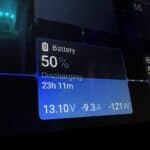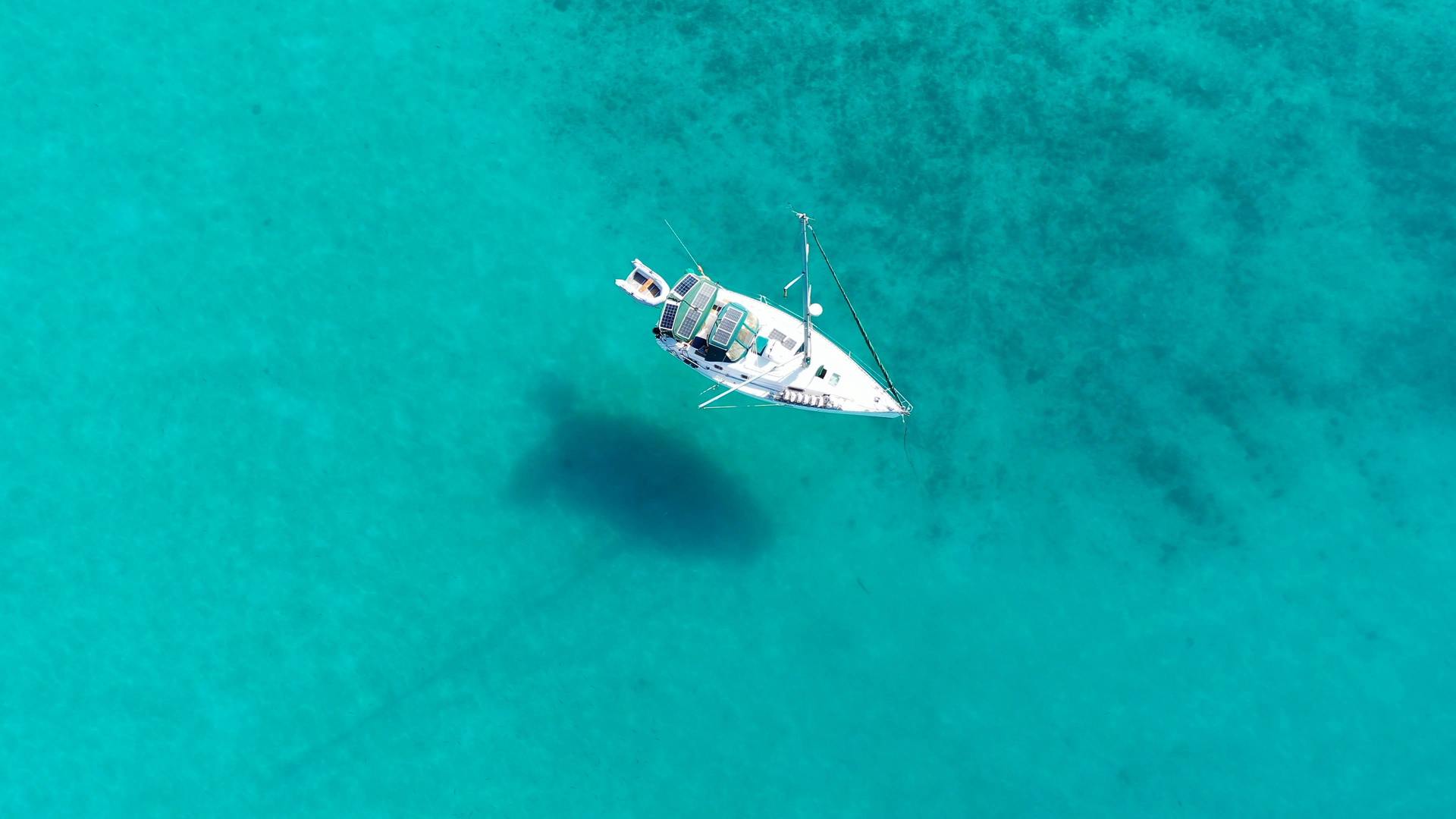
MENUMENU
TALK TO AN EXPERT
Special Hours: 7AM – 6PM PST
TALK TO AN EXPERT
Special Hours: 7AM – 6PM PST
It’s easy to see why sailors are passionate about their time on the water. Whether it’s a trip around your local marina or circumnavigating the globe, the exhilaration of setting sail and harnessing the power of wind can offer a genuine sense of freedom. Unlike those loud motor vessels, sailboats have the great advantage of not requiring any fuel, lowering environmental emissions, and are incredibly fun to sail.

When you’re out on the water, the last thing you want to worry about is having enough power to sustain your adventure. With Battle Born Batteries, this concern is a thing of the past. Our lithium batteries supply two to three times more power in the same space, decrease the overall weight of your vessel (with only 1/5 the weight of lead-acid), and allow 100% use of amp-hour capacity.
Battle Born Batteries are capable of being charged up to five times faster than a standard lead-acid battery so you can spend less time waiting on your batteries to charge and more time doing what you love.
If you have any questions or would like a consult for setting up your specific application, give us a call at (855) 292-2831 or email us at [email protected] to speak with a technical sales specialist.
Or keep reading to learn more about why lithium batteries are the superior choice for sailboat electrical systems!
The world of sailboat batteries is changing, with lithium technology shaking up decades of conventional wisdom. So let’s take a closer look at why this cutting-edge technology works so well in this age-old mode of transportation.
Since the advent of batteries in sailboat electrical systems, the technology has been pretty much the same at its core. Lead-acid batteries have improved over time but still rely on the same basic structure and process for generating power. They’re heavy, often require regular maintenance, and have limits on how much they can discharge before recharging, potentially leaving you short on power when you need it most.
None of this is ideal for a free-wheeling, fast-moving mode of transportation like sailing. But until recent years, those looking to have battery power while out on the water didn’t really have any other choice.
Sailboat batteries aren’t all created equal. In almost all cases, you’ll want two distinct varieties for the two main battery uses on your boat. Each offers specific strengths designed for its intended use.
Starting batteries are responsible for powering up any engines on your boat. They’re specially designed to provide a powerful burst of electricity over a short period of time and crank up your engine before it runs on its own. You shouldn’t use these batteries for extended periods. They can die if you discharge them too deeply. However, the engine’s alternator can quickly bring them back to full power.
House batteries are what you’ll use to power all of the other electric needs of your sailboat when not connected to shore power. These “deep-cycle” batteries excel at providing stable energy over a long period, powering things like cabin lights or other comforts. You recharge them by connecting to shore power or using other means like solar or wind chargers on your sailboat.
While most sailboats still rely on traditional lead-acid batteries, a growing number are sailing into the future by upgrading to lithium batteries for their sailboat house batteries. Here are some of the biggest benefits of making the switch.
Lithium batteries are far lighter in overall weight than a comparable lead-acid battery — often half the weight! This allows boat owners to cut a significant amount of weight while keeping the same energy storage. And every pound matters when traveling by wind. Alternatively, owners could keep the boat at the same weight as before while dramatically expanding the storage capacity of the batteries.
Lithium batteries have a lower electrical resistance than traditional batteries, meaning they can supply a higher current to your power system. This is crucial for running power-hungry appliances like refrigerators, washers and dryers, and other items. That makes them especially valuable to liveaboard boaters or those who frequently take extended trips.
Many types of deep-cycle lead-acid batteries need maintenance. You have to top off the fluids every few weeks to ensure proper operation. This isn’t the case with lithium batteries. Not only are lithium batteries essentially maintenance-free, but they also last significantly longer than their lead-acid counterparts. This means, for many people, a lithium battery is a “set it and forget it” situation, where a properly-installed battery can operate for years without a second thought. Goodbye, battery anxiety!
No one likes charging their batteries when they’d rather be out on the water. Lithium batteries allow you to cut your charging time considerably, sometimes by hours. You can also discharge them more deeply than lead-acid batteries, doubling the benefits by extending the time between shorter charges.
Additionally, lithium batteries have more battery life cycles than lead-acid and can be recharged/discharged from any state of charge. This makes them the best solar battery storage despite potentially irregular charge cycles that don’t return the batteries to 100%. This type of cycling can damage lead-acid batteries. But you can expect continued performance for years if you use solar, wind, alternator charging, or a combination thereof to charge lithium-ion batteries.
In our long-lasting high-quality cylindrical cells, heavy use will yield around 3000-5000 discharge cycles before the battery reaches 80 percent of its original capacity.
With some modifications, the answer is yes! However, it’s not as simple as just swapping out your lead-acid batteries for lithium ones and calling it a day. Lithium battery systems do require some additional electrical hardware to charge and use properly. This primarily consists of a battery management system (BMS), which monitors the batteries to prevent any damage during charging. All Battle Born Batteries come equipped with a built-in BMS that takes all common battery failures out of the picture.
You can read All About Battle Born’s Battery Management System here.
You may also need or want to update or add other electrical infrastructures like inverters, solar panels, or wind generators to take advantage of the full potential of your new lithium capabilities.
Unfortunately, most new sailboats these days still come with traditional lead-acid batteries. After all, it’s cheaper, and many manufacturers and average boaters feel satisfied with this tried and true technology.
However, high-end sailboats are the exception here. Many of these luxury models have house lithium battery systems from the start. They recognize the superior performance and other benefits that will be common in the future.
You’ll almost always want at least two batteries — a starting/engine battery and a house battery. However, liveaboard boaters or those who take extended trips off-grid may want to expand their house battery power system.
Consider all the devices and appliances you’ll use while out on the water, from your fridge and heater to lights and outlets, as well as how long you’ll use them. You should also remember that additional batteries add both weight and cost, so don’t overdo it. If you need help determining how big your system should be, call our friendly Nevada-based tech support team to discuss.
Let’s consider this question in two ways.
The length of time a battery in a sailboat electrical system will be available on a single charge will vary widely depending on the capacity of your battery, the nature of your power usage, and the type of battery you’re using. Larger capacity batteries or situations with low power usage will obviously make your battery last longer. Lithium batteries will also last significantly longer than lead-acid ones due to storing more energy and their ability to discharge fully.
The time before you need to replace your sailboat battery will also depend on your battery choices. Traditional lead-acid batteries can last from two to five years when properly and regularly maintained. However, lithium batteries will last much longer before replacement — often eight to 10 years! That means for every lithium battery you’d buy, you’d be buying at least two and potentially as many as five traditional ones.
Installing lithium batteries on a sailboat unfortunately isn’t cheap. Typically, an initial installation, including batteries, will run between $5,000 and $15,000. Where your system will land within that range will depend on your capacity needs as well as the difficulty of installation in your sailboat.
While the initial cost may spark some sticker shock, keeping it in context is crucial. Lithium battery systems will often save money in the long run, as lithium batteries typically last many times longer than comparable lead-acid versions.
It’s crucial to consider your circumstances with something as significant and potentially expensive as a lithium battery upgrade. Ask yourself how often you use your boat, what your power usage is like, and what your overall budget looks like. Some infrequent sailors or those without much cash to spare may find an upgrade isn’t right for them.
But for those looking for the best quality marine battery power system for your sailboat, it’s hard to beat lithium. While the upgrade may be a bit pricey upfront, you’ll enjoy years of benefits and cost savings down the road.
If you have any questions or would like a consult for setting up your specific application, give us a call at (855) 292-2831 or email us at [email protected] to speak with a technical sales specialist.
Shop Best Sellers








Ask a technical specialist now at 855.292.2831
Stay in the Know
2 thoughts on “Using Lithium Batteries in Sailboat Electrical Systems”
Can you recommend a battery/ component installer for a sailboat in or near Deltaville, Virginia
Thank you,
Charles
Check out our list of certified dealers and installers here! https://battlebornbatteries.com/find-a-certified-dealer-installer/